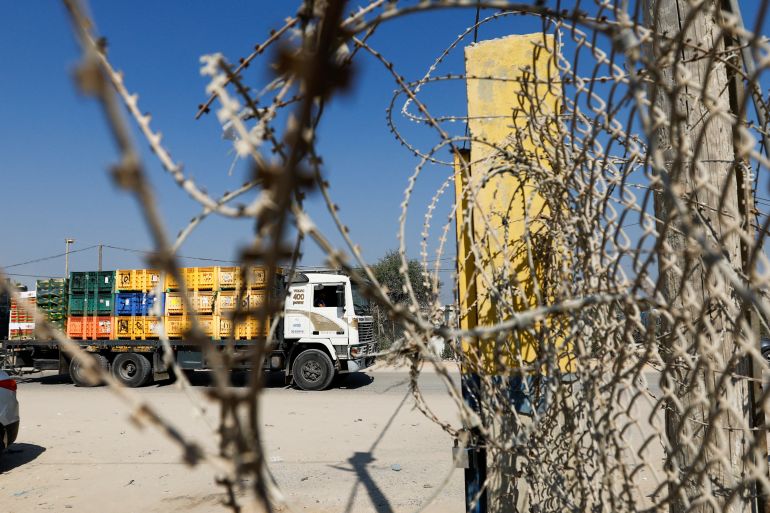UN aid chief sees ‘promising signs’ on opening of new crossing to Gaza
Martin Griffiths says the Karem Abu Salem crossing may be opening ‘soon’ to facilitate aid deliveries to Gaza.

United Nations aid chief Martin Griffiths has said the Karem Abu Salem crossing, known as Kerem Shalom in Israel, between Israel and Gaza could soon be opened to allow more humanitarian aid to be delivered to the war-torn Palestinian territory.
“We’re still negotiating,” Griffiths told reporters in Geneva on Thursday. “There are promising signs now that that may be able to open soon.”
Keep reading
list of 3 itemsDeadly air strike in Gaza area where Israel told people to go
Why do German politicians think supporting Israel is ‘morally right’?
Aid is currently trickling through to Gaza via the Rafah crossing on the Egyptian border. The opening of Karem Abu Salem would “be the first miracle we’ve seen for some weeks, but would also be a huge boost to the logistical process and logistical base of a humanitarian operation,” Griffiths said.
The UN aid chief stressed the need for aid to be delivered in a more sustained and organised fashion. “We do not have a humanitarian operation in the south of Gaza that can be called by that name any more,” he said.
“What we have at the moment … [is] at best humanitarian opportunism,” he said, adding that trucks crossing through relied on chance rather than planning. “It’s erratic, undependable and, frankly, not sustainable.”
Speaking to reporters in Israel, Colonel Elad Goren, head of the civil department at COGAT, the Israeli agency for civilian coordination with the Palestinians, said: “We will open Kerem Shalom just for inspection. It will happen in the next few days.”
Goren said a COGAT team was engaged in discussions with the United States, the United Nations and Egypt on how to raise the volume of humanitarian assistance. He said Israel would like the international community to increase its capabilities.
“We won’t be the problem. We will adjust ourselves for all the needs. The needs are up to the UN. If they will tell us that there is a need for 200 trucks and they have the capabilities to take it, it’s not a problem,” Goren said.
The UN on Monday said aid teams had only “extremely limited” movement in the south, where civilians were fleeing to, and that access to the north was “now entirely blocked”.
United Nations Secretary-General Antonio Guterres on Wednesday invoked Article 99 of the UN Charter, urging the UN Security Council to act on the war in Gaza.
Article 99 allows the secretary-general to “bring to the attention of the Security Council any matter which in his opinion may threaten the maintenance of international peace and security”.
Griffiths stressed the whole humanitarian community was behind the move. “Stop the fighting, let’s have an immediate ceasefire,” he said.
Palestinian Ambassador to the UN Riyad Mansour expressed his hope that the Security Council would adopt a resolution calling for a ceasefire on Friday. To pass, a resolution needs at least nine votes in favour and no vetoes by the five permanent members, namely the United States, Russia, China, France or the United Kingdom.
“We hope for a successful action by the Security Council,” Mansour told reporters.
Some 1.8 million Palestinians are residing in southern Gaza after an order from the Israeli military to leave the north of the strip in mid-October.
The UN and NGOs have warned of the spread of disease including cholera due to the total collapse of the sanitation system and the absence of clean water.
Arwa Damon, founder of the NGO Inara, which works with injured refugee children, told Al Jazeera that some medical conditions were more likely to be more severe for those displaced in Gaza due to malnutrition.
“Children as malnourished as children in Gaza are today … hypothermia can begin to set in at much higher temperatures,” she said.
The Israeli assault on Gaza has killed at least 17,177 people in the span of two months, according to Palestinian authorities, including more than 7,000 children.
Damon said the suffering in the besieged strip was beyond imagination. “In 20 years as a war correspondent, I have never seen this,” she said. “I haven’t even seen anything that is comparable to this.”